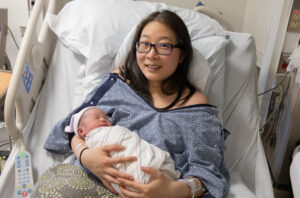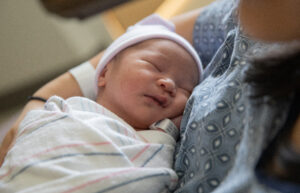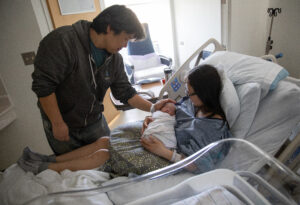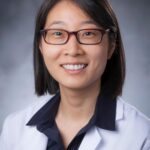This past leap day (Feb. 29), Kai Sun, MD, MS, gave birth to her third child, a daughter named Chloe Gayoung Paik.
What makes her daughter’s birth so unusual is that Dr. Sun, an assistant professor in Medicine at Duke University, Durham, NC, is also a leapling (or leaper). She was also born on Feb. 29—40 years ago.
“My husband and I thought it would be very cool if Chloe were born on leap day, too,” she says, adding that she now looks forward to celebrating both birthdays on the same day. “Our other two kids, who are 3 and 5, are just a little bit jealous that their baby sister is the only one who gets to share a special day with Mom.”
Of the roughly 8 billion people on this planet, only 5 million people worldwide share the leap day birthday. The odds of being born on leap day are just one in roughly 1,460, making it the rarest birthdate of all, according to the Associated Press. But giving birth to a child who’s also born on leap day, like Dr. Sun experienced, takes things to a higher level. The odds of that happening are roughly one in 2.1 million.
Throughout the decades, many famous people have been born on leap day, such as the late singer Dinah Shore, NASA astronaut Jack Lousma and retired hockey player Cameron Ward, to name a few.
Dr. Sun says she is reminded of her good fortune every time she looks at Chloe’s face. Although luck played a role in the same mother and daughter leap day birthdays, Dr. Sun says hard work and perseverance enabled her to become a physician and medical researcher.
“Diligence is the mother of good luck,” she says, quoting Benjamin Franklin. “That summarizes my life over the past 40 years, which traveled a narrow path.”
Tough Transition
Dr. Sun was born in China to a family of doctors and medical researchers. She lived with her grandparents in China until the age of 12, when she immigrated to the U.S. to join her parents, who had been studying and working in Rochester, N.Y.
Moving to a new country, learning its language and customs, and leaving friends behind can be traumatic for any child.
“I didn’t want to leave my grandparents and friends behind,” she recalls. “It was challenging, to say the least, to move halfway around the world, speak a new language, make new friends and be a teenager, all at once.”
- 2011: Graduated Washington University School of Medicine in Sant Louis, Missouri
- 2011–2014: Internship and Residency, Internal Medicine, McGaw Medical Center of Northwestern University, Chicago
- 2014–2017: Fellowship in rheumatology, Hospital for Special Surgery–New York Presbyterian Weill Cornell Medicine, New York
- 2015–2017: MS degree, Epidemiology and Health Services, Weil Cornell Graduate School of Medical Sciences, New York
- 2015–2017: Training Fellowship, Agency for Healthcare Research and Quality (AHRQ) Health Services, New York
- 2017: Musculoskeletal Ultrasound Certification in Rheumatology Examination
- 2019–present: Assistant Professor in Medicine at Duke University, Durham, N.C.
- 2021–present: Reviewer for annual ACR Convergence abstracts on patient outcomes, preferences and attitudes 2022–present: Member, ACR Committee on Research
Dr. Sun considers those challenges and the hard work it took to overcome them blessings that helped shape who she is today. She sometimes felt her socio-cultural background put her at a disadvantage in medical school in comparison to some of her American-born peers. However, her upbringing in China proved an asset at the University of North Carolina at Chapel Hill in 2009 when she landed a coveted research position as a Doris Duke Research Fellow. The opportunity involved conducting HIV research at the Chinese Center for Disease Control and Prevention in Beijing, which required applicants to be fluent in Chinese. That qualification alone narrowed the field of applicants down to just one person—Dr. Sun, who was a medical student at the time.
“I credit the position for helping shape the course of my medical career,” she says, adding that it steered her toward internal medicine residency and engaged her in research in epidemiology and medication adherence, a focus of her career today.
While at Duke, Dr. Sun received the Research to Advance Healthcare (REACH) Equity Career Development Award in 2018 to study racial disparities in medication adherence among patients with lupus. Three years later, she received the Duke CTSA KL2 award to continue her efforts to refine and adapt an adherence intervention for patients with a spectrum of chronic rheumatic diseases. Then, in 2023, she was awarded her first R01 from the National Institutes of Health to test the effect of adherence intervention to improve both patient-clinician communication and medication adherence among patients with lupus.
Thankful for Mentors
When asked how she wants to be recognized, Dr. Sun didn’t hesitate to respond. “A lot of people have helped me along the way,” she says, pointing to Dorothy Dunlop, PhD; Rowland Chang, MD, MPH; Lisa Mandl, MD, MPH; and Megan Clowse, MD, MPH. “I was lucky to have had great mentors who pointed me in the right direction. I want to pay that forward to future trainees, improve medical adherence for lupus patients and reduce health disparities.”
Dr. Sun says the multi-system, multi-symptom complexities of rheumatology are a perfect fit for her personality. She enjoys the challenge of puzzling through solutions to complicated problems and considering a variety of diagnostic and treatment options to best fit patients’ circumstances.
“Rheumatology is a growing field,” says Dr. Sun. “It’s constantly evolving, and I feel a sense of fulfillment helping patients with complex situations like those with lupus. Trying to solve some of the challenges they face is the core motivation for my research.”
Carol Patton is a freelance writer based in Las Vegas.






